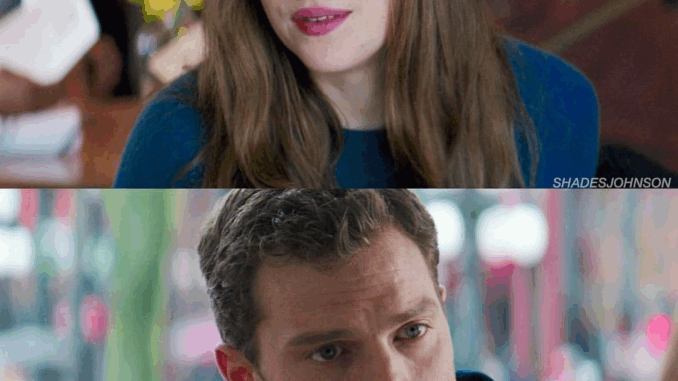
For years, Jamie Dornan has been synonymous with Christian Grey, the brooding billionaire from the Fifty Shades trilogy. The role catapulted him from relative obscurity into international superstardom, plastered his face on billboards, and transformed him into a household name almost overnight. But it also came with a price — the kind of typecasting and scrutiny that can suffocate an actor’s career. Now, after years of speculation, Dornan has finally opened up about why he has never accepted another role quite like Christian Grey, despite being relentlessly pursued by studios desperate to recreate that lightning-in-a-bottle phenomenon.
Dornan’s revelation is both candid and layered with a sense of relief. “I’ll always be grateful for Fifty Shades because it gave me opportunities I might never have had otherwise,” he admitted in a recent interview. “But that doesn’t mean I want to live in that character forever. When the franchise ended, I made a conscious choice to step away from roles that felt too similar. I didn’t want to become a caricature of myself.”
Hollywood, of course, wanted the opposite. After the runaway box office success of the first film and its sequels, producers scrambled to find the “next Christian Grey” storyline — powerful men with dark secrets, erotic dramas dripping with tension, and romantic thrillers designed to cash in on the same formula. Scripts flooded Dornan’s inbox, many of them with eye-watering paychecks attached. And yet, time and again, he said no. For fans, the refusals raised questions. Why wouldn’t he want to ride the wave of success that made him famous?
The answer, Dornan says, lies in his commitment to growth. “As an actor, you want to be challenged. You want to explore different sides of humanity. If I kept playing the same role over and over, no matter how profitable, I’d be stuck. That’s not why I became an actor.” His words strike at the heart of a dilemma that many stars face: do you chase the paycheck or chase the craft? For Dornan, the choice was clear, even if it meant turning down roles that other actors would have killed for.
Critics have long debated Dornan’s relationship with Fifty Shades. Some argue it trapped him in a franchise that was ridiculed as much as it was loved. Others say it gave him a platform he wisely used to springboard into more complex roles. Dornan himself admits it’s complicated. “It’s a strange thing,” he said. “You can’t deny the cultural impact, but you also can’t deny that it came with a lot of judgment. For a while, I felt like everything I did was viewed through that lens. It took time, and some very different roles, to step outside of Christian Grey’s shadow.”
And those roles have been deliberate. From the chilling serial killer in The Fall to the tender father in Belfast, Dornan has built a résumé that proves his range. Each project feels like a step further away from Grey — a conscious reshaping of his identity as an actor. When asked if he ever regrets turning down the flood of Grey-like roles, he shakes his head. “Not once,” he insists. “If I had said yes to them, I’d probably still be stuck in that world. I wouldn’t have had the chance to do something like Belfast, which is one of the most meaningful projects of my career.”
But while Dornan may never play another Christian Grey, he doesn’t harbor bitterness about the experience. In fact, he often speaks warmly of his co-star Dakota Johnson and the bizarre journey they shared together. “We went through something unique, something that was bigger than us,” he said. “It wasn’t always easy, but we supported each other, and I’ll always respect her for that.” His gratitude for the fans is also clear. “There are millions of people who loved those movies. They connected with them, and they connected with us. That’s not something I’ll ever take lightly.”

Still, Dornan’s resolve remains firm. No matter how tempting the offer, he won’t be lured back into the same mold. “I know what those roles look like, and I know how they’re written. They don’t interest me anymore. I’m drawn to complexity, to stories that surprise me, to characters who feel real. That’s where I want to put my energy.”
In a way, his refusal to repeat himself has made Dornan even more desirable to Hollywood. Far from pigeonholing him, his rejection of Grey-like roles has given him credibility as an actor with standards, someone who isn’t afraid to walk away from easy money in pursuit of longevity. Studios may still chase him with offers, but Dornan has made it clear: he’s not for sale.
His stance has also inspired admiration from his peers. One director described him as “fearless,” noting that many actors in his position would have cashed in until the trend fizzled out. Instead, Dornan carved out a path that feels both riskier and ultimately more rewarding. “He could have been the face of a dozen Grey knock-offs,” the director said. “Instead, he’s building a career with depth. That’s rare in this business.”
So where does that leave Jamie Dornan now? At the peak of his powers, with a reputation as both a heartthrob and a serious actor, free from the chains of a single character. His story is no longer just about Fifty Shades. It’s about resilience, reinvention, and the courage to say no when the world expects you to say yes. And while fans may never see him reprise a role like Christian Grey, perhaps that’s exactly the point.
In his own words: “I don’t need another Christian Grey. I’ve already lived that life. Now I want to see what else is out there.”